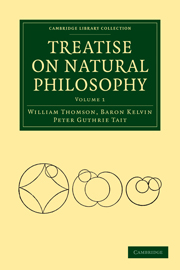Preface
Published online by Cambridge University Press: 07 September 2010
Summary
Les causes primordiales ne nous sont point connues; mais elles sont assujetties à des lois simples et constantes, que l'on peut découvrir par l'observation, et dont l'éude est l'objet de la philosophie naturelle.—FOUEIER.
THE term Natural Philosophy was used by NEWTON, and is still used in British Universities, to denote the investigation of laws in the material world, and the deduction of results not directly observed. Observation, classification, and description of phenomena necessarily precede Natural Philosophy in every department of natural science. The earlier stage is, in some branches, commonly called Natural History; and it might with equal propriety be so called in all others.
Our object is twofold: to give a tolerably complete account of what is now known of Natural Philosophy, in language adapted to the non-mathematical reader; and to furnish, to those who have the privilege which high mathematical acquirements confer, a connected outline of the analytical processes by which the greater part of that knowledge has been extended into regions as yet unexplored by experiment.
We commence with a chapter on Motion, a subject totally independent of the existence of Matter and Force, In this we are naturally led to the consideration of the curvature and tortuosity of curves, the curvature of surfaces, distortions or strains, and various other purely geometrical subjects.
The Laws of Motion, the Law of Gravitation and of Electric and Magnetic Attractions, Hooke's Law, and other fundamental principles derived directly from experiment, lead by mathematical processes to interesting and useful results, for the full testing of which our most delicate experimental methods are as yet totally insufficient. A large part of the present volume is devoted to these deductions; which, though not immediately proved by experiment, are as certainly true as the elementary laws from which mathematical analysis has evolved them.
The analytical processes which we have employed are, as a rule, such as lead most directly to the results aimed at, and are therefore in great part unsuited to the general reader.
We adopt the suggestion of AMPÈRE, and use the term Kinematics for the purely geometrical science of motion in the abstract.
- Type
- Chapter
- Information
- Treatise on Natural Philosophy , pp. v - viiiPublisher: Cambridge University PressPrint publication year: 2009First published in: 1883



